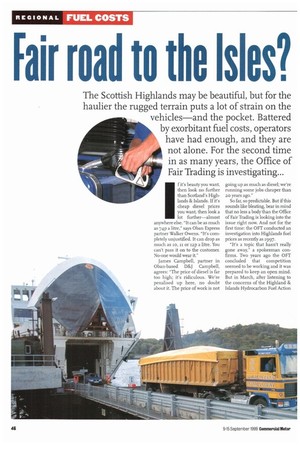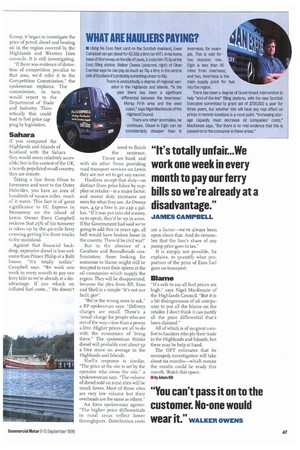Fair road the Isles?
Page 48

Page 49

If you've noticed an error in this article please click here to report it so we can fix it.
The Scottish Highlands may be beautiful, but for the haulier the rugged terrain puts a lot of strain on the vehicles—and the pocket. Battered by exorbitant fuel costs, operators have had enough, and they are not alone. For the second time in as many years, the Office of Fair Trading is investigating...
fit's beauty you want, then look no further than Scotland's Highlands & Islands. If it's cheap diesel prices you want, then look a lot further—almost anywhere else. "It can be as much as 74p a litre," says Oban Express partner Walker Owens. "It's completely unjustified. It can drop as much as io, ii or izp a litre. You can't pass it on to the customer. No-one would wear it."
James Campbell, partner in Ohan-based D&J Campbell, agrees: "The price of diesel is far too high; it's ridiculous. We're penalised up here, no doubt about it. The price of work is not going up as much as diesel; we're running some jobs cheaper than zo years ago."
So far, so predictable. But if this sounds like bleating, bear in mind that no less a body than the Office of Fair Trading is looking into the issue right now. And not for the first time: the OFT conducted an investigation into Highlands fuel prices as recently as 1997.
"It's a topic that hasn't really gone away," a spokesman confirms. Two years ago the OFT concluded that competition seemed to be working and it was prepared to keep an open mind. But in March, after listening to the concerns of the Highland & Islands Hydrocarbon Fuel Action Group, it began to investigate the price of petrol, diesel and heating oil in the region covered by the Highlands and Western Isles councils. It is still investigating.
If there was evidence of distortion of competition peculiar to that area, we'd refer it to the Competition Commission," the spokesman explains. The commission, in turn, would report to the Department of Trade and Industry. Theoretically this could lead to fuel price capping by legislation.
Sahara
If you compared the Highlands and Islands of Scotland with the Sahara they would seem relatively accessible; but in the context of the UK, a heavily populated small country, they are remote.
Taking a line from Oban to Inverness and west to the Outer Hebrides, you have an area of hundreds of square miles, much of it water. This fact is of great significance to EC Express in Stornoway on the island of Lewis. Owner Ewen Campbell reckons that 25% of his turnover is taken up by the 40-mile ferry crossing getting his three trucks to the mainland.
Against that financial backdrop, expensive diesel is less welcome than Prince Philip at a Bald. house. "It's totally unfair," Campbell says. "We work one week in every month to pay our ferry bills so we're already at a disadvantage. If you whack on inflated fuel costs..." He doesn't need to finish the sentence. Times are hard, and with six other firms providing road transport services on Lewis they are not set to get any easier. Hauliers accept that duty—as distinct from price hikes by sup plier or retailer is a major factor; and recent duty increases are seen for what they are. As Owens says, 4.5p a litre is 20-22p a gallon. "If it was put into old money, so to speak, they'd be up in arms. If the Government had said we're going to add this ro years ago, all hell would have broken loose in the country. There'd be civil war!"
But in the absence of a Cavaliers and Roundheads confrontation, those looking for someone to blame might still be tempted to vent their spleen at the oil companies which supply the region. They will be disappointed, because the plea from BP, Esso and Shell is a simple "it's not our fault, guy".
"We're the wrong ones to ask," a BP spokesman says. "Delivery charges are small. There's a 'zonal' charge for people who are out of the way—less than a penny a litre. Higher prices are all to do with the economics of living there." The spokesman thinks diesel will probably cost about 5p a litre more on average in the Highlands and Islands.
Shell's response is similar. "The price at the site is set by the operator who owns the site," a spokeswoman says. "The volume of diesel sold on rural sites will be much lower. Most of those sites are very low volume but their overheads are the same as others."
An Esso spokesman agrees: "The higher price differentials in rural areas reflect lower throughputs. Distribution costs
are a factor—we've always been open about that. And do remember that the lion's share of any pump price goes in tax."
It is simply not possible, he explains, to quantify what proportion of the price of Esso fuel goes on transport.
Blame
"It's safe to say all fuel prices are high," says Nigel MacKenzie of the Highlands Council. "But it is a bit disingenuous of oil companies to put all the blame on the retailer. I don't think it can justify all the price differential that's been claimed."
All of which is of no great comfort to hauliers who ply their trade in the Highlands and Islands, but there may be help at hand.
The OFT estimates that its monopoly investigation will take about six months—which means the results could be ready this month. Watch this space.
Mby Adam Hill












































































































